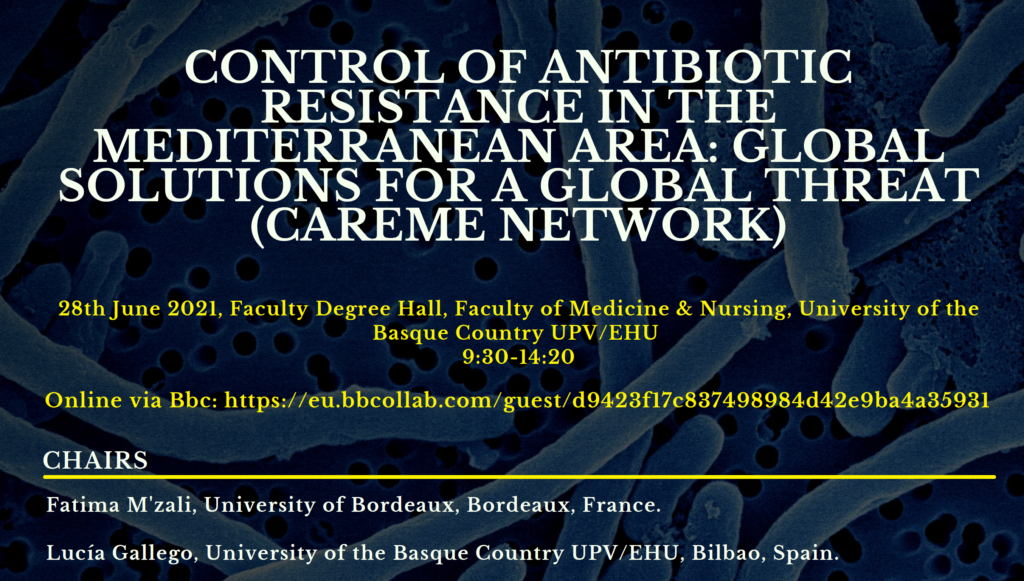Researchers from the University of the Basque Country have recently attended the second meeting of the CAREME network (Control of Antibiotic Resistance in the Mediterranean Area: Global Solutions for a Global Threat), an international network dedicated to research in the city of Alexandria (Egypt). of resistance to antibiotics.
The network, directed by professors Lucía Gallego, professor of Medical Microbiology at the UPV/EHU, and Fátima M’Zali, professor at the University of Bordeaux, held its first meeting in June 2021, at the Faculty of Medicine and Nursing in the Basque public university, within an initiative financed by the Euskampus Foundation and framed in the strategic alliance of the UPV/EHU with the University of Bordeaux. This second meeting took place in Alexandria, specifically on the Abu Qir Campus of the Arab Academy for Science, Technology & Maritime Transport, an institution with which the UPV/EHU has signed a collaboration agreement.
The CAREME network aims to be a meeting point to create an international consortium that effectively develops solutions aimed at mitigating the devastating effects of antibiotic resistance on the health and economy of Mediterranean countries. Today, antibiotic resistance is one of the greatest threats to global health and is putting Medicine as we know it at risk. The post-antibiotic era is already a reality: it produces a high rate of therapeutic failure and morbidity and mortality. If solutions are not found, it is estimated that by 2050 it will cause more deaths than cancer, also endangering the achievement of the Sustainable Development Goals. To make this panorama worse, the availability of new antibiotics is less and less, since very few molecules have been developed since the 1960s.
The global spread of multi-resistant bacteria that emerge in the hospital setting is a problem of the first order, but it is not limited to the clinical setting, since in recent years there have been numerous publications that describe resistant isolates also in other settings, such as the environment and the animal.
Investigadoras de la UPV /EHU asisten a la reunión de la red CAREME en Egipto, red de investigación dedicada a mitigar los efectos adversos de los antibióticos.
Investigadoras de la Universidad del País Vasco han asistido recientemente en la ciudad de Alejandría (Egipto) a la segunda reunión de la red CAREME (Control of Antibiotic Resistance in the Mediterranean Area: Global Solutions for a Global Threat), red internacional dedicada a la investigación de la resistencia a los antibióticos.
La red, dirigida por las profesoras Lucía Gallego, profesora de Microbiología Médica de la UPV/EHU, y Fátima M’Zali, profesora de la Universidad de Burdeos, celebró su primera reunión en junio de 2021, en la Facultad de Medicina y Enfermería de la universidad pública vasca, dentro de una iniciativa financiada por la Fundación Euskampus y enmarcada en la alianza estratégica de la UPV/EHU con la universidad de Burdeos. Esta segunda reunión ha tenido lugar en Alejandría, concretamente en el Campus de Abu Qir de la Arab Academy for Science, Technology & Maritime Transport, institución con la que la UPV/EHU tiene firmado un convenio de colaboración.
La red CAREME pretende ser un punto de encuentro para crear un consorcio internacional que desarrolle con eficacia soluciones dirigidas a mitigar los efectos devastadores de la resistencia a los antibióticos en la salud y la economía de los países mediterráneos. Hoy día, la resistencia a los antibióticos es una de las mayores amenazas a la salud global y está poniendo en riesgo la Medicina tal y cómo la conocemos. La era postantibiótica es ya una realidad: produce un alto índice de fracasos terapéuticos y morbimortalidad. Si no se encuentran soluciones, se calcula que para 2050 causará más muertes que el cáncer, poniendo en peligro además la consecución de los Objetivos de Desarrollo Sostenible. Para empeorar este panorama, la disponibilidad de nuevos antibióticos es cada vez menor, ya que muy pocas moléculas han sido desarrolladas desde los años 60.
La diseminación global de bacterias multirresistentes que emergen en el ámbito hospitalario es un problema de primer orden, pero no se limita al espacio clínico, ya que en los últimos años son numerosas las publicaciones que describen aislamientos resistentes también en otros ámbitos, como el medioambiental y el animal.


